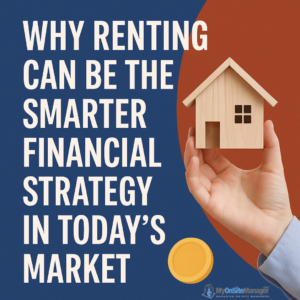For decades, the message was clear: if you wanted to build wealth and be considered a responsible adult, you needed to own a home. Homeownership was hailed as the American Dream—safe, smart, and stable. But that traditional mindset is now being challenged by a growing number of people who are finding that renting can actually lead to greater financial freedom, better returns, and a more flexible lifestyle.
In a recent opinion piece on Salon, personal finance expert Ramit Sethi made headlines by boldly stating, “I’ve made more money renting than buying.” His perspective isn’t just anecdotal—it reflects a larger shift in the way we evaluate financial wellness and long-term planning in an increasingly unaffordable housing market.
The Myth of Homeownership as a Guaranteed Investment
One of the strongest arguments for buying a home has always been that it’s an investment. But Sethi—and many financial analysts—urge consumers to take a closer look at the math.
Owning a home doesn’t just mean making a mortgage payment. It also comes with:
-
Property taxes
-
Maintenance and repair costs
-
HOA fees (in many cases)
-
Insurance
-
Utilities
-
Closing costs when buying and selling
These costs add up quickly, and they aren’t always offset by rising property values. In fact, depending on the housing market and how long someone stays in their home, homeowners may actually lose money after accounting for inflation and transaction fees.
Sethi notes that many homeowners make the mistake of comparing rent payments to mortgage payments without factoring in the true cost of ownership. When done properly, renting often ends up being the more financially sound decision—especially when the difference is invested strategically elsewhere.
Renting Isn’t “Throwing Money Away” Anymore
A common belief is that renters are wasting money because they’re not building equity. But the reality is more nuanced.
According to a recent study by Bankrate, renting is currently more affordable than buying in all 50 of the largest metro areas in the U.S. The average monthly mortgage payment for a median-priced home has climbed to $2,703, while average rent for the same period is just $1,979—a 36.6% difference. That extra $700+ per month can be put to much better use if managed wisely.
For renters who invest the savings they gain from not owning—either through retirement accounts, index funds, or other appreciating assets—the financial return can outperform the typical gains from homeownership, without the burden of ongoing property maintenance.
The Hidden Lifestyle Tax of Homeownership
Beyond dollars and cents, homeownership also ties people down. There’s the emotional toll of unexpected repairs, the time spent on upkeep, and the decreased ability to move quickly for job opportunities or lifestyle changes.
Sethi points out that renting allows him to focus on what matters most: living a life filled with flexibility, travel, and freedom from constant home-related decisions. He’s rented for 20 years, traveled extensively, and still invested wisely—all while skipping the hassles of leaky roofs, busted pipes, or HOA disputes.
Flexibility and Mobility in a Rapidly Changing Economy
With remote work on the rise and more Americans changing jobs or cities frequently, the value of flexibility cannot be overstated. Selling a home takes time and effort, and there’s no guarantee you’ll get the price you expect—especially if the market turns.
Renters can relocate on relatively short notice, adjust their lifestyle to match their income, and avoid the financial entanglement that comes with owning property.
Changing Perceptions Around Renting
There’s still a stigma attached to renting—often fueled by outdated ideas of adulthood, success, and wealth. But that’s starting to change.
Many modern renters are doing so by choice, not necessity. They’re prioritizing quality of life, travel, investment opportunities, and the ability to adapt in uncertain economic times. The cultural shift is real, and it’s increasingly backed by sound financial logic.
As Sethi puts it: “I’ve made more money renting than I ever would have if I bought.” His experience is proof that the “rent vs. buy” debate isn’t one-size-fits-all. It’s about your lifestyle, your values, and how you plan to grow your wealth over time.
Final Thoughts: Homeownership Isn’t the Only Path to Wealth
Buying a home may still be the right choice for some—but it’s no longer the only benchmark of financial success. Renting, when done intentionally and paired with smart investing, can offer both financial advantages and a more fulfilling lifestyle.
So before you feel pressured to buy that house, take a step back and ask: Is this the best move for me? Or is it just what I’ve been told I should do?
Read the full article here: I’ve Made More Money Renting: Why Buying Isn’t Always the Best Option

